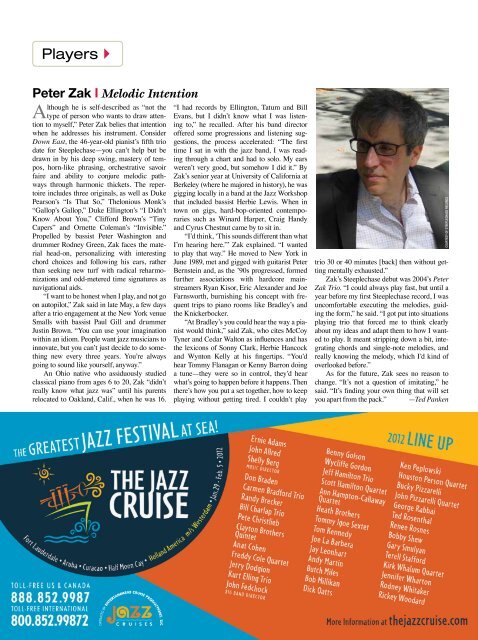You also want an ePaper? Increase the reach of your titles
YUMPU automatically turns print PDFs into web optimized ePapers that Google loves.
Players <br />
Peter Zak I Melodic Intention<br />
Although he is self-described as “not the<br />
type of person who wants to draw attention<br />
to myself,” Peter Zak belies that intention<br />
when he addresses his instrument. Consider<br />
Down East, the 46-year-old pianist’s fifth trio<br />
date for Steeplechase—you can’t help but be<br />
drawn in by his deep swing, mastery of tempos,<br />
horn-like phrasing, orchestrative savoir<br />
faire and ability to conjure melodic pathways<br />
through harmonic thickets. The repertoire<br />
includes three originals, as well as Duke<br />
Pearson’s “Is That So,” Thelonious Monk’s<br />
“Gallop’s Gallop,” Duke Ellington’s “I Didn’t<br />
Know About You,” Clifford Brown’s “Tiny<br />
Capers” and Ornette Coleman’s “Invisible.”<br />
Propelled by bassist Peter Washington and<br />
drummer Rodney Green, Zak faces the material<br />
head-on, personalizing with interesting<br />
chord choices and following his ears, rather<br />
than seeking new turf with radical reharmonizations<br />
and odd-metered time signatures as<br />
navigational aids.<br />
“I want to be honest when I play, and not go<br />
on autopilot,” Zak said in late May, a few days<br />
after a trio engagement at the New York venue<br />
Smalls with bassist Paul Gill and drummer<br />
Justin Brown. “You can use your imagination<br />
within an idiom. People want jazz musicians to<br />
innovate, but you can’t just decide to do something<br />
new every three years. You’re always<br />
going to sound like yourself, anyway.”<br />
An Ohio native who assiduously studied<br />
classical piano from ages 6 to 20, Zak “didn’t<br />
really know what jazz was” until his parents<br />
relocated to Oakland, Calif., when he was 16.<br />
“I had records by Ellington, Tatum and Bill<br />
Evans, but I didn’t know what I was listening<br />
to,” he recalled. After his band director<br />
offered some progressions and listening suggestions,<br />
the process accelerated: “The first<br />
time I sat in with the jazz band, I was reading<br />
through a chart and had to solo. My ears<br />
weren’t very good, but somehow I did it.” By<br />
Zak’s senior year at University of California at<br />
Berkeley (where he majored in history), he was<br />
gigging locally in a band at the Jazz Workshop<br />
that included bassist Herbie Lewis. When in<br />
town on gigs, hard-bop-oriented contemporaries<br />
such as Winard Harper, Craig Handy<br />
and Cyrus Chestnut came by to sit in.<br />
“I’d think, ‘This sounds different than what<br />
I’m hearing here.’” Zak explained. “I wanted<br />
to play that way.” He moved to New York in<br />
June 1989, met and gigged with guitarist Peter<br />
Bernstein and, as the ’90s progressed, formed<br />
further associations with hardcore mainstreamers<br />
Ryan Kisor, Eric Alexander and Joe<br />
Farnsworth, burnishing his concept with frequent<br />
trips to piano rooms like Bradley’s and<br />
the Knickerbocker.<br />
“At Bradley’s you could hear the way a pianist<br />
would think,” said Zak, who cites McCoy<br />
Tyner and Cedar Walton as influences and has<br />
the lexicons of Sonny Clark, Herbie Hancock<br />
and Wynton Kelly at his fingertips. “You’d<br />
hear Tommy Flanagan or Kenny Barron doing<br />
a tune—they were so in control, they’d hear<br />
what’s going to happen before it happens. Then<br />
there’s how you put a set together, how to keep<br />
playing without getting tired. I couldn’t play<br />
trio 30 or 40 minutes [back] then without getting<br />
mentally exhausted.”<br />
Zak’s Steeplechase debut was 2004’s Peter<br />
Zak Trio. “I could always play fast, but until a<br />
year before my first Steeplechase record, I was<br />
uncomfortable executing the melodies, guiding<br />
the form,” he said. “I got put into situations<br />
playing trio that forced me to think clearly<br />
about my ideas and adapt them to how I wanted<br />
to play. It meant stripping down a bit, integrating<br />
chords and single-note melodies, and<br />
really knowing the melody, which I’d kind of<br />
overlooked before.”<br />
As for the future, Zak sees no reason to<br />
change. “It’s not a question of imitating,” he<br />
said. “It’s finding your own thing that will set<br />
you apart from the pack.” —Ted Panken<br />
Courtesy of Steeplechase Records
















